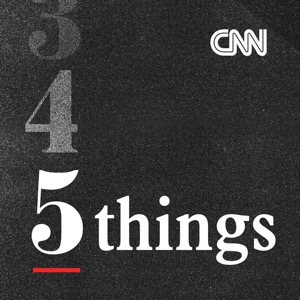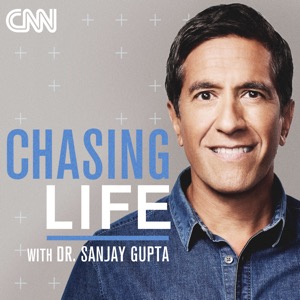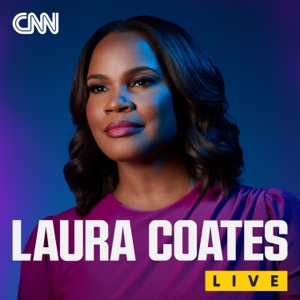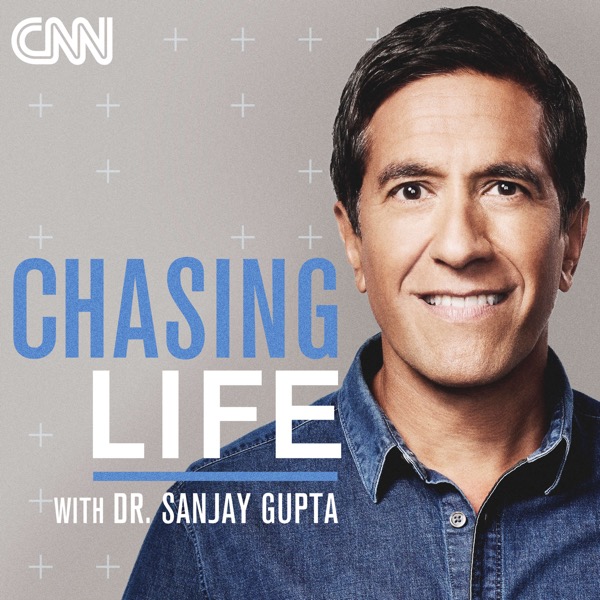Dr. Sanjay Gupta
00:00:00
You know, it was sort of news as a journalist you never want to report on.
Just in to CNN. Very sad news. Actor Matthew Perry has died at the age of 54. The Los Angeles Times citing law enforcement sources is reporting the FRIENDS star was found dead today in a hot tub at his Los Angeles home.
Dr. Sanjay Gupta
00:00:22
Matthew Perry. His death last fall was just such a gut punch, so heartbreaking on so many levels. For so many of us, he represented joy. He represented comfort as Chandler Bing, the star character on FRIENDS.
I'm not great at the advice. Can I interest you in a sarcastic comment?
Dr. Sanjay Gupta
00:00:43
I used to watch that show all the time, and I was actually pretty amazed that my teenage girls seemed to love that show as much as I did. Truly intergenerational. We had so many fond memories together, and I think it was pretty jarring for us to realize that at the same time, Perry was starring on friends. He was also really struggling with addiction. He talked about this in a memoir that he wrote called 'Friends, Lovers, and the Big Terrible Thing.' I was stunned to learn, for example, that he had attended 6000 Alcoholics Anonymous meetings. He entered rehab 15 times, and then one year after his memoir published, Perry was found dead, according to the autopsy report. The cause of death was, quote, the acute effects of ketamine and drowning. Recently, five people were charged in connection with his death. Every single detail about this case is heartbreaking. And I must tell you, for me as a medical reporter, it also started to lead to a lot of questions about ketamine. You've probably heard of ketamine. You've probably heard the name. You've heard about its use as a party drug. For me, I've known about ketamine for decades because of its use as an anesthetic, primarily a dissociative anesthetic in surgery. It's also a powerful hallucinogen. And, yeah, it had this long history as a party drug. We have seen the side effects of misuse. It can be devastating. But at the same time, it was complicated to just be critical of ketamine because there are some doctors who saw enormous potential in its use.
Drugs that have powerful effects on the mind can be powerfully therapeutic, but it can also be incredibly damaging when not used the right way.
Dr. Sanjay Gupta
00:02:32
That's Doctor David Feifel. He's a researcher, a psychiatrist, also one of the first clinicians in the country to use ketamine to specifically treat depression. So on today's podcast, everything you want to know about ketamine, the science behind how it works, what it really does to your brain, and just how risky is it?
The biggest risk is the fact that the ketamine treatment is associated with an altered state of thinking. You know, when we're talking about psychoactive drugs, there's always a possibility that it'll be very unpleasant, could be emotional, which is actually not a bad thing. It's actually usually very positive, but sometimes it could be very scary.
Dr. Sanjay Gupta
00:03:17
Plus, how ketamine so quickly became such a booming business. Some experts are now calling it the Wild West of therapy. What does that mean for people who are seeking out treatment? It is a thorny medical issue, but today I think we're in pretty good hands. I'm Doctor Sanjay Gupta, CNN's chief medical correspondent, and this is Chasing Life.
Dr. Sanjay Gupta
00:03:47
'For starters, I think it's important to note that ketamine is not a new drug, even if you're just hearing about it for the first time. It's been around since the 1960s. It was used as a battlefield anesthetic during the Vietnam War. In recent years, I've done a lot of reporting on the growing research into ketamine as a possible treatment for depression, post-traumatic stress, even chronic pain. I got to tell you philosophically, I'm generally pretty skeptical of so-called new breakthrough therapies of any kind. A lot of times there's so much hype, but very little hope. So as things stand now, I think it's important to note ketamine is currently not FDA approved for the treatments of conditions like depression or pain. But at the same time, as I mentioned, it is approved as an anesthetic, and that means doctors can prescribe ketamine for other uses. It's a common practice called off label use. In Matthew Perry's case, he was pretty open about using ketamine to treat depression and anxiety off label. But in the news release on those charges brought him Perry's death. The U.S. Attorney's Office for the Central District of California suggested that Matthew Perry had developed a growing need for the drug and that other doctors, not the ones that were directly involved in his treatment, were actually selling the drugs to Perry, despite being informed at least a week earlier that his ketamine addiction was, quote, spiraling out of control. Again, the point I'm making is that Perry obtained these drug through his doctors, we are told, not on the streets. And that probably doesn't sit well with you. Doesn't sit well with me. It raises serious questions for me about the safety and the ethics behind prescribing this medication. And that's why I wanted to reach out to someone who has been researching and prescribing ketamine for years now, Doctor David Feifel.
When I started in psychiatry, one of the motivations was that I knew mental illness was an incredible scourge of society. The statistics are just unbelievable. You know, in terms of rates of depression, anxiety, PTSD and suicide. And they are not getting better. And after 50 years of medications, they really haven't gotten better. So there's a huge need. One of the things that appealed to me was I really felt that we're on the precipice of the golden era of a revolution in psychiatry, because there is this huge unmet need. But to be honest with you, ten years or so into my career, I was wondering whether I may have miscalculated. So when I read the first paper on ketamine, I was really excited. Although I must say extremely skeptical. It was a small study and the results were, you might say, too good to be true. But when the second paper came out a few years later replicating that, I said, okay, I'm still skeptical, but if it's half as good as these papers seem to suggest, we've got something unprecedented. And that made me say, I have to try this. Because of this, if some of this is real, you know, I don't want to be still practicing the same old way. But I was at a time at that's where UC San Diego and I went to. You know, the administration said, I want to give ketamine, to give all the person you want to do what? It's a very kind of harebrained idea. But, you know, I persisted. I explained it and eventually got sort of the green light to do that, and the rest was sort of history, as that ended up being that first program to treat mental illness with the ketamine infusions.
Dr. Sanjay Gupta
00:07:22
Today, Doctor Feifel is the founder of Kadima Neuropsychiatry Institute. It's a private San Diego clinic where he does administer ketamine therapy to patients. One of the first things he told me was something pretty amazing about the way ketamine really works. It does not do what traditional antidepressants do. Most of those other drugs, like Prozac, for example, target a neurotransmitter called serotonin. Cymbalta, another antidepressant, targets the neurotransmitter norepinephrine in addition to serotonin. But with ketamine, most of the attention is focused on glutamate, which is in fact the most abundant chemical messenger in the brain. It influences things like memory and cognition. One of the things that seems to happen with ketamine is this enhancement of neuroplasticity. That is to say that it stimulates these new pathways in the brain, almost like new little sprouts on a tree. Even the setting in which ketamine is administered is going to sound and feel a little different than traditional antidepressants.
Ketamine is such a different type of treatment than traditional treatments, not just for depression, but in medicine in general. And one of the major differences is that the actual setting and the patient's state of mind. When they are receiving the treatment play a big role in the outcome, the therapeutic effect, and it's not something we typically think of in medicine. The traditional paradigm of Western medication treatment is the medicine carries the therapeutic effect. It is designed to fix something in your body, and the patient's role is just to, you know, take it, put it inside their body, catch a pill or show up to get the infusion so we can put it inside. And then we generally we don't care if the patient's had a good day or a bad day, or how comfortable or tense they feel in the room, or what they feel and the the nurses, you know, kind of rude or not rude, it doesn't matter. The drug is going to do its thing. With ketamine, it's so different because whether it works and how well it works, it seems to be highly dependent on patient's state of mind, and they're at ease with the setting. That's kind of not how we usually think in medicine. So that means we pay a lot of attention to the treatment rooms. They're very calming. The lighting's calming, you know. We have immersive projection of nature scenes. All the things that make people calm. The staff are trained to make put people at ease. We actually have a session before the first treatment where we prepare patients to know what to expect, because if they are not sure that this was this is normal, they may worry that they're having a bad reaction and then, you know, they're not going to be able to lean into the psychedelic like experience and therefore probably get less therapeutic benefit from it. And that makes treating patients with ketamine a whole different type of medicine that depending on the kind of doctor you are, you at that time either will turn you off or it will really excite you because it's much more complex, but but also much more rewarding. So we do pay a lot of attention to the setting and the patient's mental state.
Dr. Sanjay Gupta
00:11:07
'We wanted to talk to you because you are somebody who's helping patients in all sorts of different ways, but certainly with ketamine as well. You know, if you're taking like a statin drug or an antihypertensive, there's no concern really and not really any significant concern about, you know, recreational use with medications like cannabis. We've done a lot of reporting on potentially, you know, benefits of cannabis as a medicine, psilocybin as a medicine, MDMA, even. There's been some new reporting in terms of post-traumatic stress and ketamine, as we're talking about. I'm just curious, doctor, how do you sort of just navigate that philosophically when you have a legitimate substance that can provide benefit for people but can also be abused against opioids would be on that list? How do you think about it? How do you approach your practice differently? How much time do you spend educating about those issues in addition to the just pure medical aspects?
I think early on in my career, I had to kind of come to was sort of a heuristic about drugs that had abuse potential and therapeutic potential. And when was that the situation with any given patient? What did it follow along that along? Because, you know, ketamine is by no means unique in this way. My philosophical approach, I it's not very philosophical. It's very utilitarian, I would say, is that if any drug that I'm prescribing, if the evidence suggests that it is making my patient have a better quality of life, might be a better, you know, productive citizen, then I don't care what dose you're on and whether you were physically depended on it, you know, because the net plus is so much better than having untreated anxiety without repercussion. On the other hand, if the drug is helpful but then, you know, starts to lose its efficacy because of tolerance and the patient is needing more to get that more. And then it starts to have, you know, side effects. They are kind of slow and exciting asleep at work and their cognition is starting to be impacted. That clearly is something we have not moved the needle in the right direction. We just add another layer, another problem. And that is that is in the abuse spectrum of things. And that that treatment should be discontinued. So that's how I approach this. Like what's the what's the net result also factoring in. And this is very important. And doctors often don't do this because they're often frankly more concerned about their own license safety. What's the what's the alternative if we don't treat this patient, you know, what are the what's the morbidity and mortality with untreated anxiety.
Dr. Sanjay Gupta
00:13:56
'Now unfortunately, as the case of Matthew Perry shows us, not all doctors are administering medications quite as thoughtfully as Doctor Feifel. One of the points he raises is that you really have to closely monitor for two things. Is the drug still working or not, and has the risk of abuse higher and higher doses? Escalating doses? Has that become more apparent? And there's another big factor you have to consider in all of this the money. After the break, I'm going to ask Doctor Feifel about that, about what he makes of the fact that ketamine is so quickly becoming a big business. Plus, what about you? Have you ever considered the risks and benefits of ketamine yourself? We're going to talk about that in just a moment. But first, as I've mentioned in the past, we're going to be starting a new segment. It's called Doctor Sanjay Gupta on Call. I'm going to be answering your questions every week. It can be about an episode of the podcast, a question you might have from the news, or frankly, anything, any health and medical topic that might be on your mind. Give me a call (470)?396-0832 or email me at I Sanjay at gmail.com. Next week we're going to be answering our very first questions. Stay tuned for that.
The biggest risk is the fact that the ketamine treatment is associated with a altered state of thinking. A psychedelic like state of thinking for a short period of time. And there's a lot of there's a substantial amount of evidence that that is part of the therapeutic effect. This this psychedelic like experience allows people to view things, through a different lens that seems to play a role in their improvement. So. You know, when we're talking about a change in, you're thinking, a psychoactive drug, there's always a possibility that it'll be very unpleasant, or it could be emotional, which is actually not a bad thing. It's actually usually very positive, even if it's, if it's sadness, it's something that's coming out. But sometimes it can be very scary. Sometimes people can have hallucinatory experiences that make them feel scared, and that's why it's important to do it with trained staff who know how to intervene and abort that. So I would say the number one risk is sort of psychological, you know, the experience itself. Medically speaking, is is quite safe in the short term and the long term.
Dr. Sanjay Gupta
00:16:46
When it comes to risks like let's not name the drug, but let's just say in general, if somebody is going to be on it for a long time, or maybe even for the rest of their lives, if they're going to be dependent on it to the point where if they were to stop it, they might have symptoms of withdrawal and things like that. How do you sort of convey those risks, like if you're going to we'll say Valium for the sake of this conversation, if you're going to be on that for your whole life, some dose so that you can be functional, a better spouse, better sibling, better colleague, whatever it might be, and you're functioning well. Do we know enough about what the I guess the long term concerns are, is that data out there on some of these drugs?
I think it's a drug by drug situation. There are some drugs that have been around for decades. And we have it's not really well controlled studies. We have, you know, naturalistic evidence for decades of use. And so we have some drugs come out and they're fairly new and they look very promising, but we just don't have the long term data. And so I think the first and foremost thing is let the patient know. I mean, you know, this is ultimately a patient's decision. So informed consent is so critical. And we have to let people know that there might be an undocumented risks that appeared, you know, post decade continuous use. And we just don't know. Or it's like we can be pretty confident that, you know, there won't be any risks talking up that we don't know because it's drugs been around for 50 years and it's been used widely and and so on and so forth.
Dr. Sanjay Gupta
00:18:17
Take for example Ritalin or Adderall for ADHD. You know, I've always wondered now that we have decades and decades of data was giving those drugs, especially to children really the right thing to do?
'A stimulant treatment for ADHD was at that stage years ago, you know, when it was becoming more popular. Give it to kids. It's a very scary proposition. You know, you're young brain and you're giving stimulant medication, which essentially is a version of that. Fetterman sounds horrible, sounds like the wrong thing to do. And yet the data now are surprisingly pro treatment. I mean, really solid data in terms of kids that have ADHD that get treated, have lower risks of drug abuse, low risk of crime and incarceration, go further in terms of educational accomplishments, you know, have have less medical issues. The data are so compelling. And even the brain studies show that the abnormalities we can identify with ADHD are mitigated by the treatment compared to those who don't get treatment. Recently, researchers in Sweden published a very large study based on a registry. They looked at two two year period of I think it was literally hundreds of thousands of people diagnosed with ADHD, some of which were treated, some which were not. And you're going to be really surprised, the fact that they found that mortality was lower in those who were treated mainly from unnatural causes, because, again, it goes back to the disease itself. We know that if you don't treat ADHD, you get higher, motor vehicle accidents. You're going to, engage in behaviors that are more risky and so forth. So sometimes it's counter-intuitive.
Dr. Sanjay Gupta
00:20:12
This is a topic that comes up in my own dinner table. Where do we draw the line at prescribing potentially addictive medications compared to the risk if we don't? In the case of the study Dr. Feifel referenced researchers found that treating ADHD with medications could reduce the mortality risk for patients in the two years after diagnosis. And I think if you listen to a doctor fearful of saying he's making a pretty strong argument, that the risks of under treating mental health issues can be just as dire. Unfortunately, though, sometimes people just overstate the benefits, and that really complicates the matter. In the case of ketamine, a growing number of clinics are offering the drug off label as a quick fix for just about anything, even though, again, as a reminder, ketamine is only FDA approved as an anesthetic. Part of the reason no surprise is it's become really big business by one market research firms estimates. Ketamine clinics were a $3.4 billion business in 2023 and projected to grow about 10% a year through 2030.
The situation right now is so different than when I started the first ketamine program in 2008, we were the only, place you can go to get ketamine outside of the place. They were doing research studies. And so, you know, we were inundated with, people from all over. Now, there's often several within a, you know, five mile radius. However, the problem is many of these providers are not optimal. In general, a large proportion of the clinics are not run by mental health professionals, namely psychiatrists. I actually just got a request to help coach a urologist who wanted to open a ketamine clinic, and I didn't take that off. I think it's completely inappropriate. It would be as inappropriate as me wanting to, you know, open up a urology clinic. So I'm probably going to get, hit from this. I think a big motivation, for a lot of these, providers is the fact that it's a good business model, and we're not. I think they're interested. It would be lowered. So it really represents kind of a bit of a minefield for patients who've heard about ketamine. They're trying to figure out where they should go. That makes all the difference for patients. And they really need to kind of, get educated on what makes it like an appropriate provider and clinic versus one that maybe is not as suspicious for the treatment.
Dr. Sanjay Gupta
00:22:45
So if someone maybe even listening to this podcast right now is interested in seeking treatment, here's where Feiefel says to start:.
Their psychiatrist even if they don't practice with ketamine themselves, are probably aware of their local colleagues who do so. And and the ones who, you know, have a good reputation. And, so I think that's a good place to start. The truth of the matter is, a lot of people find physicians these days through Google searches, through the website. And the danger there is, you know, the thing that pops up first and can have the nicest website. That's something that that money can buy, right? It doesn't mean it's a good clinic. So I think you have to dig deeper and see who's who's behind the clinic that is run by mental health professionals. And if you can't see who's behind it, then you should worry. You should worry if a clinic is engaging in other kinds of treatments that don't seem to reflect a true, evidence based commitment to treating mental illness. For example, I seen a ketamine provider that advertised on their storefront that not only do they do ketamine, but the hair transplant, pain management and I.V. hydration and vitamins. So that would be some that would be a provider I would probably steer away from, because it sounds like their choice of what they provide is more driven by what they can legally provide and what might bring in a good sort of revenue.
Dr. Sanjay Gupta
00:24:17
Feifel also recommends looking for a doctor who includes psychotherapy as part of the treatment plan.
The highest standard is to do ketamine treatments in the context of the specialized type of psychotherapy called ketamine assisted psychotherapy, and so a provider that also has a multidisciplinary team that includes licensed therapist who are trained in this, that's sort of a barometer of a very, you know, high level of commitment to the best practices in ketamine as opposed to just come in, you know, we'll stick a needle in you, we'll give you an infusion. And there you go.
Dr. Sanjay Gupta
00:24:55
And his final tip: steer clear of telehealth providers when it comes to this:
There are companies now that will, you know, have patients do a quick telemedicine consultation with, let's say, a nurse practitioner just to check that box that it was, you know, there was a medical assessment and then they get sent, ketamine to their house to do on their own. And that's exactly part of the problem. You know, doing it on your own, unsupervised thinking that's alloh you know of this is fine. So people should still steer clear of, ketamine, at least initially, you know? And then it's possible I'm not ruling it out, but that it would should be, done under the context of the provider that that initially gave it to them, in the office intravenously, intramuscularly, and then maybe transition. That's, that's a little more acceptable. But to have just like from the get go, to sign up with some company and get it sent to your house, I think is a recipe for disaster.
Dr. Sanjay Gupta
00:25:56
You know, as Doctor Feifel was speaking, I was still thinking about Matthew Perry. He initially started using ketamine to ease his own depression. And I wanted to ask Doctor Feifel what he made of all this, and whether he thought ketamine itself was really the cause of his death.
The conclusion of the pathologist was that he died because of the acute direct effects of ketamine. And then, as contributing factor drowning, it is almost impossible to die from an even from an overdose of ketamine alone. Now, if it's mixed with other drugs and there were at some other drugs, but I don't think that they were of the of the dose or kind that the Matthew Perry would have died from alone. Almost all the deaths from ketamine in terms of recreational use are because what will happen in during a ketamine, under the influence of ketamine. People do not have their cognitive faculties. They do not have their motor factor. You know, they can't stand or walk, very well. They can protect themselves from things. You know, they're inquiry, our patients. We watch them very carefully. And if they stand up, we run over and, you know, guide them back to the chair because they will fall over. So had a pool not been there? I think Matthew Perry would be alive. It was the fact that he was under the influence of ketamine. And you should not be around, you know, bodies of water or any kind of anything dangerous unsupervised because your interaction with those is going to be potentially fatal.
Dr. Sanjay Gupta
00:27:32
I guess it's always hard to predict how much of an impact something like that would have on the legitimacy of ketamine in legitimate clinics. But what do you see? Or what do you anticipate?
I think the impact on the legitimate therapeutic use of ketamine is going to be relatively limited for a couple of reasons. One is by now, I think there's been so much evidence and coverage of its lifesaving potential and its benefits that it can absorb this hit, I think, without sinking it. The other thing is, it's such a deviation from the the normative therapeutic process that I think it's it'll be easier for people to separate this. You know, this didn't happen in a clinic, you know, under treatment. This was clear cut drug use and drug selling. And the people who were who were involved had clearly no other motivation than profit. There was no medical oversight. This was not you know, this was not given in any anything that resembled a medical context. So we understand that people there, you know, that there are people who trafficking drugs and unfortunately, people who get addicted to drug to drugs, even drugs that are relatively low on the addiction potential scale. And ketamine is. So I think people in their minds will separate this. This was so grievous. I mean, you you know, you've heard the the texts that were sent by the doctor about, you know, how much was more pain. Is that is this not medical care?
Dr. Sanjay Gupta
00:29:08
'Anyone who has struggled with addiction knows how hard it can be to beat. But I want to end today's episode with a little bit of hope from Matthew Perry himself in his 2022 memoir. He wrote, quote, when I die, I don't want friends to be the first thing that's mentioned. I want that helping other addicts to be the first thing that's mentioned. And I'm going to live the rest of my life proving that. He also said this, "I would like to be remembered as somebody who lived well, loved well, was a seeker, and his paramount thing is that he wants to help people. That's what I want, unquote." It's an incredible read, Matthew. And I think for a lot of us, that's exactly how we will remember you. Chasing life is a production of CNN audio. Our podcast is produced by Eryn Mathewson, Jennifer Lai, Grace Walker, and Jesse Remedios. Our senior producer and showrunner is Felicia Patinkin. Andrea Kane is our medical writer. Dan Dzula is our technical director and the executive producer of CNN Audio is Steve Lickteig, with support from Janice Andrest, John Dionora Haley Thomas, Alex Manesseri, Robert Mathers, Lainie Steinhardt, Nicole Pass-through, and Lisa Nabarro. Special thanks to Ben Tinker, Amanda Sealy, and Nadia Canning of CNN Health and Katie Hinman.




